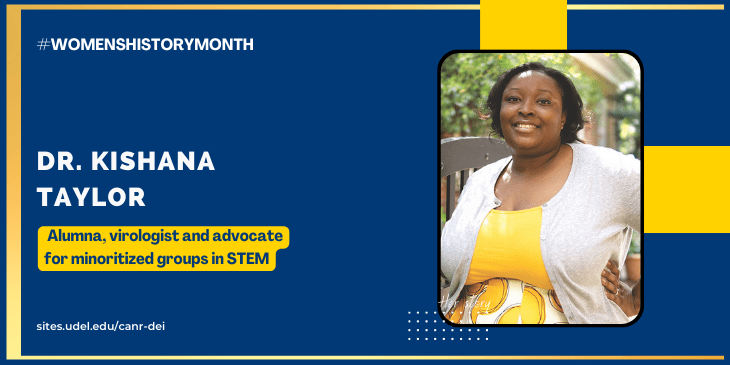When talking about women making history, not every story is set in the past. As an inspiring female making history now, Dr. Kishana Taylor is a true role model.
Dr. Taylor is an alumna of the University of Delaware’s College of Agriculture and Natural Resources (UD CANR), graduating in 2011 with a major in animal science. While at UD she was named a Woman of Promise and had been an EPSCoR and Summer Institute Research Scholar.
Taylor continued her education at George Washington University, earning a Master’s degree in Public Health Microbiology and Emerging Infectious where her work on the effects of concentrated poultry operation on the presence of antibiotic-resistant E. Coli in Chesapeake Bay watersheds was supported by the Smithsonian Institute. Dr. Taylor earned her Ph.D. from the University of Georgia in Interdisciplinary Biomedical sciences in 2018.
A virologist and postdoctoral researcher at Rutgers University, Tayor is a scientist who studies viruses of any kind, typically focusing on one group in particular. Taylor’s specialty is vector-borne diseases, which are transmitted to humans via animals and insects, such as Lyme disease and malaria, among many others.
She advocates for others through the Black Microbiologists Association, a non-profit she founded to connect Black scientists worldwide. Kishana Taylor notes that she often was one of few — and in some cases the only — Black microbiology students in her classes, and she earned three degrees without ever having had a Black professor. Through the Black Microbiologists Association, she has built a network that allows young Black professionals to engage with a diverse group of educators and scientists.
Comments closed“After the first Black Microbiology Week, we got so many emails about how important the week had been to people. We got the message that this was a needed thing, so we moved to make ‘Black in Microbiology’ a non-profit and became the Black Microbiologists Association.”
Dr. Kishana Taylor



